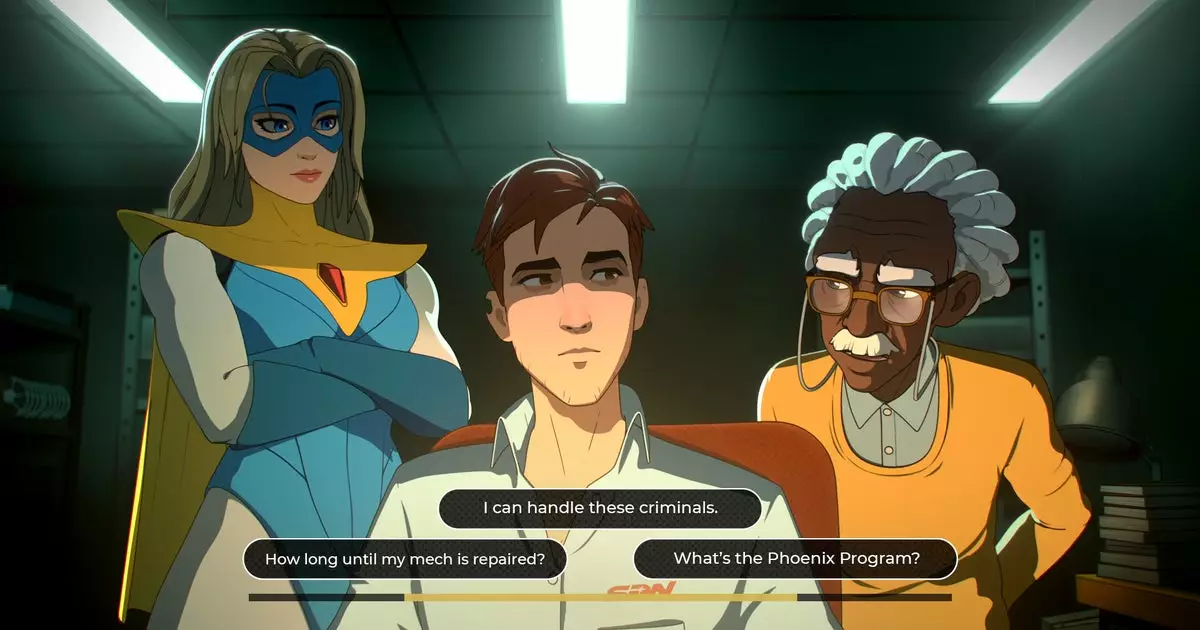In the video game landscape saturated with traditional hero narratives, “Dispatch” tangibly disrupts the norm by breathing life into a colorful array of reformed supervillains. With its blend of visual novel storytelling and light strategy elements, the game invites players to step into the shoes of the recently desk-bound Mecha Man, portrayed by Aaron Paul—a casting choice that injects an extra layer of charisma into the role. Rather than saving the day in standard heroic fashion, players are tasked with managing a motley crew of ex-villains. Their quirkiness and morally ambiguous backgrounds are not just entertaining but also serve as a biting commentary on the archetypical hero-villain dynamic.
By assigning various zany tasks to your team—like having a dancing French assassin rescue a balloon stuck in a tree or sending an ever-transforming batman to thwart a boat robbery—Dispatch cleverly marries humor with tactical decision-making. The hilarity escalates as you experience unexpected outcomes, like the unfortunate sinking of the boat and an irreversible barfight that leaves one establishment in shambles. This chaos provides an exhilarating backdrop for exploring how far the boundaries of these characters can be pushed, reflecting their complex personalities through the bizarre situations they face.
Dynamic Dialogue and Rich Characterization
One of the standout features of Dispatch is its captivating dialogue and character interaction. The vibrant exchanges among the team while they respond to emergencies feel organic and humorous, akin to a well-crafted podcast. The interactions offer not just comic relief, but also deeper insight into each character’s psyche. With the inclusion of well-known voice actors like Jeffrey Wright and Laura Bailey, every character resonates with distinctiveness that enhances the overall narrative experience.
The game does not shy away from presenting multiple layers of character attributes, making these seemingly ridiculous figures relatable and more human. You find yourself chuckling not just at the absurdity of their powers but also at their personal struggles. This duality sets the stage for thoughtful storytelling, reminiscent of titles such as “The Wolf Among Us,” where character depth often mirrors the messiness of their respective journeys.
The Risk of Humor and Representation
However, the marriage of humor and representation in Dispatch is not without its challenges. The initial playthrough introduces some questionable racial humor that raises concerns about the potential for insensitive punchlines as the narrative unfolds. In a gaming landscape increasingly demanding sensitivity toward mental health, neurodivergence, and disability, the risk of trivializing serious issues while attempting to induce laughter is a tightrope act.
The creators, AdHoc Studio, are certainly navigating challenging waters here, especially with a comedic ensemble that teeters on the edge of eccentricity. Striking a balance between genuine humor and mindful representation can be daunting; while characters do embody exaggerated traits, the risk lies in overshooting into the realm of caricature. As players dive deeper into the game, it will be crucial to observe how this narrative evolves and whether it broadens its comedic approach without veering into offense.
Charting New Horizons in Game Design
Equipped with an engaging premise and charming visuals, Dispatch represents a refreshing shift in game design where the focus extends beyond conventional heroism. The narration frames the game as an exploration, not just of whimsical plots, but also of the flawed yet lovable characters who inhabit this chaotic world. As more players sample the demo, it becomes evident that the game is poised to attract those nostalgic for Telltale’s earlier works, while pushing forward into uncharted territories of storytelling.
What the game achieves well is an interactive format where player choices directly influence the unfolding chaos, allowing for a sense of investment in the outcomes of the hijinks. Each decision contributes to a multifaceted narrative tapestry, encouraging players to explore new choices without the fear of confined linearity. The distinctiveness of each character and the mutual reliance exhibited during emergencies subverts the typical “team of heroes” trope, empowering players to revel in the beautifully flawed.
With Dispatch at the forefront of innovative storytelling in gaming, it invites fans to consider the value of perspective—embracing chaos, humor, and complexity as essential elements of what makes a truly compelling narrative. As the game continues to evolve, it holds untapped potential to provoke thought and laughter, all while reminding us that every villain, at some point, was crafted from a misunderstood hero.

